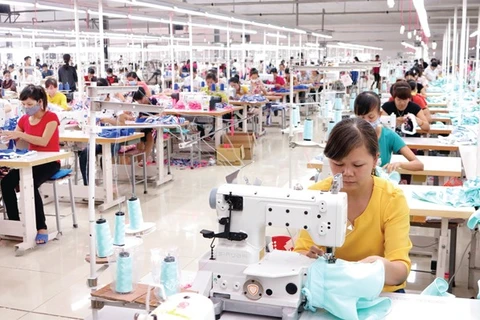Hanoi (VNA) - The whole society is currently focusing all of its efforts on epidemic prevention. Businesses are no different, searching for any opportunity to overcome this difficult time. But what will happen post-COVID-19?
In the past, when a crisis was over, its negative effects continued to infiltrate into the economy and cause even more severe damages to businesses, worse than during the crisis itself.
Do not rush into the "crisis" of cash flow
According to Nguyen Thi Thu Ha, Project Manager of Enterprising for Development Project from Oxfam in Vietnam, the way consumers consume will change after crises. Businesses need to be alert at this stage, maximising new investments if unsure, as this will affect cash flow.
Ha took an example from the financial crisis in 2008. Here the toughest time for businesses came in two years later. Lending rates were up to 18 percent per year, and many businesses had to pay interest rates of up to 25% -30% per year for loans, on top of other fees.
“Cash flow in the economy post-crisis may be scarce, so businesses need to take into account production and business plans, not counting on interest rates which only decrease in the short term. In the long run, banks are forced to look at their cash flow and make reasonable adjustments. The real crisis may come in later years,” Ha analysed.
“In business, enterprises have to know where the risk lies and always look at the cash flow. The market difficulty is not the worst, the money crisis is really the worst,” Ha emphasised.
 Dace Company’s orders are exported to the Republic of Korea and Japan as usual at the beginning of the pandemic (Photo: Collaborator/Vietnam +)
Dace Company’s orders are exported to the Republic of Korea and Japan as usual at the beginning of the pandemic (Photo: Collaborator/Vietnam +)
Creating an "Enterprise immune system"
"It would be extremely bad if businesses wait for the end of the pandemic," said Phan Tat Thu, Chairman and Chief Expert of KNV Group.
He said that everything will become harder post-pandemic, as external conditions will be extremely harsh as people may change their lifestyle, ways of thinking and the way they interact with society.
According to Thu, businesses need to consider changing business models and creating a good immune system to flexibly adapt to the business environment with a focus on four indicators, namely customers, production, finance, and cash flow.
 This year’s purchasing price of Vina Samex Company’s star anise is very high (Photo: Collaborator/Vietnam +)
This year’s purchasing price of Vina Samex Company’s star anise is very high (Photo: Collaborator/Vietnam +) Tran Tien Duc, an expert on strategic management shared the same view, stating that this difficult period is a special opportunity to change the perception of the whole of society and businesses. “This is a good time for businesses to strengthen the company's culture, core values and social responsibilities,” Duc said.
According to Duc, it is hard to know when the pandemic will end. The situation is more optimistic, but it will take much longer for the world economy to recover. It may need at least one more year.
Sharing this view, Ha suggested that businesses should revise business strategies, re-evaluate customers for the medium and long term targets. In addition, managers should spend time exchanging, caring and sharing difficulties with customers, keeping in touch with production groups and suppliers to see the commitment of the business.
“In addition, businesses need to actively look for other channels apart from banks, such as investment funds and other non-bank financial sources to be ready for business and production development as chances come,” said Ha./.























